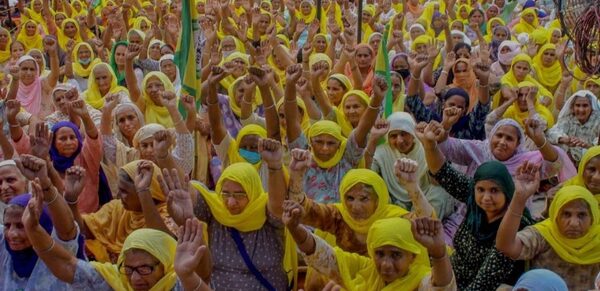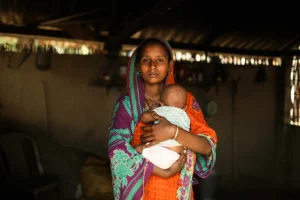How Farm Acts Affect Women In Agriculture

On 27 September 2020, three Farm Bills became law after receiving presidential assent.
The Farmers (Empowerment and Protection) Agreement on Price Assurance and Farm Services Bill 2020 , Farming Produce, Trade, Commerce (Promotion and Facilitation) Bill 2020 and the Essential Commodities (Amendment) Bill 2020,collectively referred to as the Farm Bills were earlier passed in both houses of the Parliament on 20 September and 22 September respectively. Despite repeated requests from the opposition to send the Bills to a Parliamentary Committee for scrutiny, the bills were passed through a voice vote.
The Farmers (Empowerment and Protection) Agreement on Price Assurance and Farm Services Bill 2020 bill relaxes government restrictions on the sale and purchase of farm produce while the Farming Produce, Trade, Commerce (Promotion and Facilitation) Bill 2020 proposes a legislation to facilitate direct trade with large corporations, bypassing state mandis or Agricultural Produce Market Committees (APMCs). The Essential Commodities (Amendment) Bill 2020 eases regulations on stocking produce under the Essential Commodities Act (1955).
Despite being termed ‘revolutionary’ by Union Minister for Agriculture, Narendra Tomar, the bills have received criticism from experts as well as farmers’ unions.
“The problem with the bills is that they are putting the farmers into the hands of the private players without any safeguards and without any regulations or discipline in terms of price setting. There is a lack of regulatory oversight and price-setting body”, said Sudha Narayanan, an agricultural economist at the Indira Gandhi Institute for Development Research.
Marginal and small holdings operated by women farmers together constitute 27.9 % of total operational holdings cultivated by women according to the Economic Survey of 2018-19 . While the legislation seems to be harmful for the farming community at large, farmers with smaller land holdings such as women, are likely to be worst affected.
Viewed through a gender lens, the Bills highlight the vulnerabilities of women in agriculture in India, who are largely invisible. In India, while 73.2% of rural women are engaged in agriculture, only 12.8% women have land holdings according to government data. 81% of women agricultural workers are from Dalit and Adivasi communities, according to a study by International Labour Organisation (ILO), who work as landless labourers. Women workers in agriculture earned 1.4 times lower than men, showed a report on Gender Responsive Budgeting in Agriculture by UN Women. Much of women’s work in agriculture is in the form of unpaid labour on family farms.
“Women farmers are invariably invisibilized in data systems since land operations are the criteria by which the census enumeration systems identify farmers and women’s toil on the land tends to be underreported in our patriarchal structures of family, state, and capitalist economy,” wrote Soma Parthasarathy, a policy analyst and member at Mahila Kisan Adhikar Manch (MAKAAM) on the inadequacy of gender data in agriculture.
In a country where 41.49% of workforce was engaged in agriculture, according to recent World Bank estimates, and the value added by agriculture and allied sectors stood at 16% of India’s Gross Domestic Product (GDP), the invisibility of women in agriculture implies that not only are their long standing concerns dismissed but their livelihoods are further jeopardised with new legislations like the Farm Acts.
What Bypassing APMCs Means For Women farmers
The Farmers’ Produce Trade and Commerce (Promotion and Facilitation) Bill, 2020 essentially barred the state governments from levying fees on purchase or sale of produce outside the Mandis functioning under the state Agriculture Produce Market Committees (APMC).
While the invisibilisation of women in agriculture extends to other male dominated spaces of trade, such as state level APMCs, they serve as an important mechanism for price discovery for women farmers.
“Women farmers have to deal with traders, merchants, middlemen and coolies. You hardly see women in these roles.” said Madhuri Khadse, a farmer from Yavatmal district in Vidarbha region of Maharashtra. “Mandis are not women friendly and it is impossible for women to deal with the situation”, she added.
“Although many women farmers sell to private traders, the existence of an APMC ensured that prices remained somewhere close to the Minimum Selling Price (MSP) and hence narrowing the margins of exploitation”, said Mahila Kisan Adhikaar Manch (MAKAAM), a forum working on women farmers’ rights, in a statement condemning the Bills.
A study by MAKAAM in Maharashtra in June 2020, showed 74% of women surveyed preferred to sell to private traders- the most cited reason being the payment of upfront cash payments. 43% said that the total quantum of their produce is lesser than that of larger farmers trading in mandis, and therefore found it difficult to negotiate individually at APMCs.
Even though women farmers prefer to trade outside the system with private traders, APMCs perform a crucial role in signalling prices. This gave bargaining power to negotiate prices even when women farmers sold outside of the APMCs.
Private traders also play an important source of credit for women farmers. Less than 4% of women farmers have access to institutional credit according to a study by Oxfam in Uttar Pradesh.
“In such a scenario, private traders fill the lacuna of credit sources for these farmers and help them in completing their harvest cycles by paying them upfront in cash”, explained Seema Kulkarni, a national facilitation team member at MAKAAM in an interview with BehanBox.
An Unequal Field For Women Farmers
Women farmers in many states are starting autonomous Farmers Producer Organisations (FPOs). In Telangana, women farmers floated ‘Benishan’, a company to procure and sell their produce in association with Farmer Producers Organisations (FPO) and Society for Elimination of Rural Poverty (SERP). Kerala’s Kudumbashree initiative, under the National Rural Livelihoods Mission, has promoted ‘Naatuchanta’ or weekly markets which are run entirely by women.
The new Farm Acts, instead of supporting them through market and state supported credit schemes, put them at par with existing traders and other big corporations and create an unequal playing field.
“The Farmers (Empowerment and Protection) Agreement on Price Assurance and Farm Services Bill, 2020, more easily referred to as the ‘Contract Farming bill’ and aims to provide a framework for written agreements between farmers and sponsors without mandating them”, explains Sudha Narayanan, in her article for The India Forum. “It allows ‘Sponsors’ to engage with farmers via written contracts, if they choose to use such contracts.”
Large corporations that enter into contracts with farmers also tend to dictate the choice of crops, and practices of cultivation that are often in favour of large industries bypassing agro-climatic concerns noted the statement by MAKAAM. The chemical intensive farming where large corporations have taken over the sector is one of the major reasons for increasing numbers of farm suicides which have rendered women as widows and powerless wage labourers.
In an attempt to fulfil the ‘One Nation, One Market’ prophecy, the bills emphasise on the e-NAM, or National Agriculture Market, to facilitate online trade across states.Studies conducted in rural Madhya Pradesh show that deep rooted patriarchal structures restrict women’s usage and access to technology. Shifting to digitalised market systems alienates women farmers who might find it difficult to adapt.
“Dealing with e-NAM requires technological know-how and digital literacy. Without proper investment in infrastructure, it has little impact on women farmers”, said Kulkarni.
Uncomfortable Silence on Minimum Support Prices
The Farm Acts are silent on the issue of MSP for crops.
MSP, even though not a legally bound system, is an important policy that determines the floor price of agricultural goods and protects small farmers from fluctuating markets.An exhaustive list of twenty four crops are covered under the MSP. Paddy and wheat are the most procured crops due to weak procurement infrastructure or failure in diversification of crops, shows a 2016 NITI Aayog study.
“The NITI Aayog study completely missed out on women farmers and their concerns related to the marketing of produce. In fact, if the findings of the study are taken on board it would amount to revising the MSP as per the Swaminathan report and guaranteeing remuneration as a legal entitlement”, said MAKAAM.
The Swaminathan report recommended that MSP should be at least 50% more than the weighted average cost of production to help improve agricultural competitiveness of farmers with small land holdings.
Women farmers have been consistently demanding pulses and oils be added to MSP, along with food grains in the Public Distribution System (PDS). The Millet Sisters, a group of women farmers from 12 states pushed for a provision of MSP for millets and recognition of women’s knowledge on millet ecology.
‘A holistic approach consisting of awareness, preannounced MSP prices, expansion of PDS and IPC, reformation of midday meals scheme and a robust decentralised procurement, can ensure food and livelihood security for women farmers, both as producers and consumers’, said Kulkarni.
Essential Commodities Act
The changes to the Essential Commodities Act by removing cereals, potatoes and pluses, from the list of essential commodities, clamps down on the storage capacity of small farmers (except under extraordinary circumstances), at a time when hoarding of food grains coexists with high malnutrition and hunger among rural poor women.
State guaranteed schemes such as PDS and Mahatma Gandhi National Rural Employment Guarantee Act (MGNREGA), the world’s largest employment guarantee scheme, have been the lifeline of the rural poor during the Covid-19 pandemic.
This amendment benefits large corporations and impacts food security goals.
“ It is also an invitation to attract big corporations and Foreign Direct Investment(FDI) into grain trade at a time when the rest of the industry is in the doldrums. 90 metric tonnes of food grains are lying in the godowns and more are to come by way of Kharif procurement. The haste in bringing in the act is quite evident”, said MAKAAM’s statement.
After being hurriedly passed in both houses of the Parliament,the Farm Bills have signalled the next big step towards the corporatization of agriculture. In response to this, farmers across the country have risen in staunch opposition, claiming the Bills do not prioritise their interests. They seem to reiterate the government’s homogenous perception of farmers to be male, able bodied and land owning, while continuing to be oblivious to the concerns of women in agriculture – scarcity of data, absence of land rights, unequal access to assets, disproportionate environmental impacts and lack of entitlements for tenant and widowed farmers.
[Aditi Premkumar is pursuing her degree in Social Sciences from Tata Institute of Social Sciences, Hyderabad. She is interested in researching women’s movements and their political participation in rural India]
We believe everyone deserves equal access to accurate news. Support from our readers enables us to keep our journalism open and free for everyone, all over the world.



